八年级英语下册Wordbank教案(新版)牛津上海版
Unit 5 第2课时 课本讲解及句型拓展-八年级英语下册(牛津上海版)

不要背诵故事,请用自己的话讲故事。
【知识拓展】 in other words 换句话说;也就是说e.g. Joe doesn't like hard work-in other words, he's lazy!
乔不喜欢干重活儿一—换句话说,他很懒!keep one's word守信e.g. Claire said she would come, and she kept her word.
You can also give warnings using don’t (e.g., Don’t touch it!, Don’t swim at this beach!, etc.). Don’t is usually used to give warnings for a future action.
克莱尔说她会来,她果然很守信用。word for word 逐字逐句地e.g. Ian repeated word for word what you told him.
4. lead…to…将…带领到… e.g. The man led all the horses to the stable.
deliciou mobile birds s food phones singing
hot water
实用英语Unit 1 (Word Bank)(第1、2组)
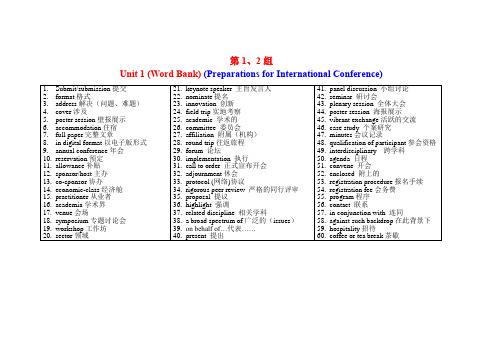
51.convene开会
52.enclosed附上的
53.registration procedure报名手续
54.registration fee会务费
55.program程序
56.contact联系
57.in conjunction with连同
58.against such backdrop在此背景下
59.hospitality招待
60.coffee or tea break茶歇
7.full paper完整文章
8.in digital format以电子版形式
9.annual conference年会
10.reservation预定
11.allowance补贴
12.sponsor/host主办
13.co-sponsor协办
14.economic-class经济舱
15.practitioner从业者
27.affiliation附属(机构)
28.round trip往返旅程
29.forum论坛
30.implementation执行
31.call to order正式宣布开会
32.adjournment休会
33.protocol(网络)协议
34.rigorous peer review严格的同行评审
43.plenary session全体大会
44.poster session海报展示
45.vibrant exchange活跃的交流
46.case study个案研究
47.minutes会议记录
48.qualification of participant参会资格
2024年初中牛津上海版英语教案
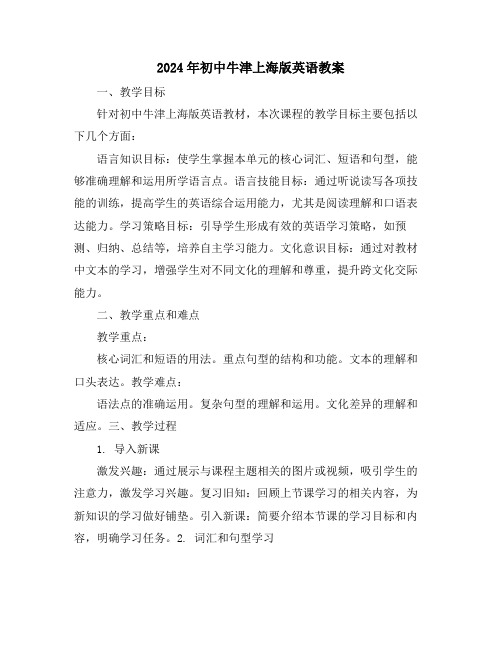
2024年初中牛津上海版英语教案一、教学目标针对初中牛津上海版英语教材,本次课程的教学目标主要包括以下几个方面:语言知识目标:使学生掌握本单元的核心词汇、短语和句型,能够准确理解和运用所学语言点。
语言技能目标:通过听说读写各项技能的训练,提高学生的英语综合运用能力,尤其是阅读理解和口语表达能力。
学习策略目标:引导学生形成有效的英语学习策略,如预测、归纳、总结等,培养自主学习能力。
文化意识目标:通过对教材中文本的学习,增强学生对不同文化的理解和尊重,提升跨文化交际能力。
二、教学重点和难点教学重点:核心词汇和短语的用法。
重点句型的结构和功能。
文本的理解和口头表达。
教学难点:语法点的准确运用。
复杂句型的理解和运用。
文化差异的理解和适应。
三、教学过程1. 导入新课激发兴趣:通过展示与课程主题相关的图片或视频,吸引学生的注意力,激发学习兴趣。
复习旧知:回顾上节课学习的相关内容,为新知识的学习做好铺垫。
引入新课:简要介绍本节课的学习目标和内容,明确学习任务。
2. 词汇和句型学习呈现新词汇:通过实物、图片或多媒体等方式呈现新词汇,帮助学生直观理解。
讲解词汇用法:详细解释新词汇的用法,包括词性、搭配等,并给出例句。
句型操练:通过替换、填空等方式,让学生操练重点句型,加深对句型的理解。
3. 文本理解和口头表达阅读文本:指导学生阅读教材文本,注意理解文本中的重点信息和语言点。
小组讨论:组织学生进行小组讨论,就文本内容展开讨论,培养口语表达能力。
汇报交流:每个小组选派代表汇报讨论成果,其他同学进行点评和补充。
4. 语法点讲解和练习呈现语法点:明确本节课的语法点,通过例句展示其用法。
讲解语法规则:详细解释语法点的构成和用法,帮助学生理解。
语法练习:设计多种形式的练习,如填空、选择、改写等,让学生充分练习。
5. 文化差异理解和适应对比文化:通过对比中英文化中的相似点和差异点,帮助学生理解文化差异。
讨论交流:组织学生就文化差异进行讨论交流,分享自己的见解和体验。
牛津上海版八年级下册英语Unit4 Lesson2 复习教案
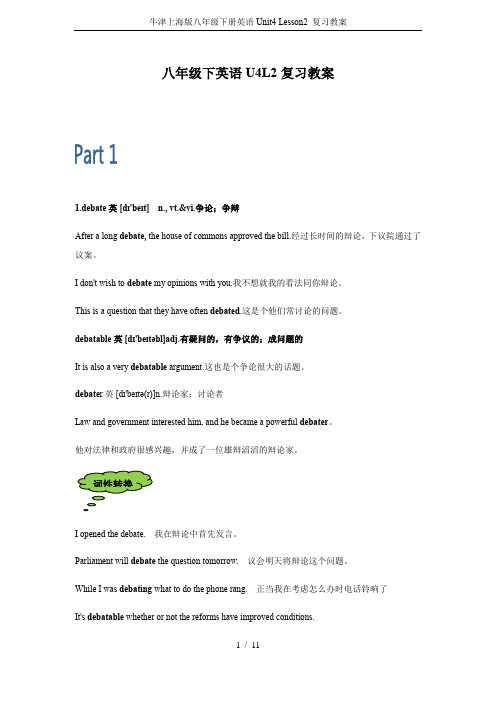
牛津上海版八年级下册英语 Unit4 Lesson2 复习教案八年级下英语 U4L2 复习教案1.debate 英 [dɪ'beɪt] n., vt.&vi.争论;争辩 After a long debate, the house of commons approved the bill.经过长时间的辩论,下议院通过了 议案。
I don't wish to debate my opinions with you.我不想就我的看法同你辩论。
This is a question that they have often debated.这是个他们常讨论的问题。
debatable 英 [dɪ'beɪtəbl]adj.有疑问的,有争议的;成问题的 It is also a very debatable argument.这也是个争论很大的话题。
debater 英 [dɪ'beɪtə(r)]n.辩论家;讨论者 Law and government interested him, and he became a powerful debater。
他对法律和政府很感兴趣,并成了一位雄辩滔滔的辩论家。
词性转换I opened the debate. 我在辩论中首先发言。
Parliament will debate the question tomorrow. 议会明天将辩论这个问题。
While I was debating what to do the phone rang. 正当我在考虑怎么办时电话铃响了 It's debatable whether or not the reforms have improved conditions.1 / 11牛津上海版八年级下册英语 Unit4 Lesson2 复习教案改革是否改善了现状,这问题仍有争议。
A debater's highest criterion is reasoning.衡量辩论家的最高标准是推理能力。
英语:chapter 2《a day in the life of…whiz-kid wendy》period 3教案(1)(牛津上海版八年级下)
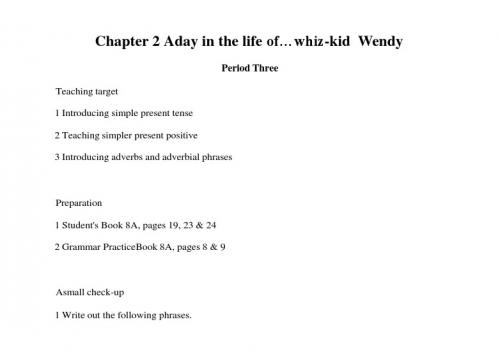
Preparation
1 Student's Book 8A, pages 19, 23 & 24 2 Grammar PracticeBook 8A, pages 8 & 9
Asmall check-up 1 Write out the following phrases.
a) go to bed b) have violin lessons c) return to school d) after school e) in ones own car f) at breakfast g) discuss thebusiness h) the manager of thecompany i) achieve Adegrees j) get up 2 Chooseand complete.
· He goes out every weekend. Shewatches alot of TV.
· Thefilm finishes at 9.30 tonight.
· He does everything for his children. · A mechanic fixes buses, cars and taxis. d) With verbs that end in consonant +y, thehe/she/it form is -ies: · Study - He studies languages at university. · Fly - The plane flies twicea week. BUT: I play - he plays I buy - shebuys e) Note: have - has · They have everything you want in that shop. · She has a housein St James' Square. 5 Question: When do weusethe simple present tense? 6 Using the simple present
牛津英语上海版单元完整教案模板

2011年浦东新区小学五年级英语新教材主题单元教学研讨Teaching Plan for Oxford English (Shanghai Edition)5A Module 3 Places and activitiesUnit 1 Around the citySchools:Chenyang Primary School(晨阳小学), Jiangzhen Primary School(江镇小学), Shangnan No.2 Primary School(上南二村小学), Daqiao Primary School(大桥小学)Teachers: Mao Qingyan(毛庆燕), Zhao Zhenying(赵震英), Sheng Jing(盛静), Ding Aihua(丁爱华)Materials:Oxford English (Shanghai Edition) 5A M3 U1 Around the cityDate: 2011-10 -19Teaching aids: Multi-media, word cards, flash, Work sheet, etc教学设计说明学生情况分析:经历了四年多的英语学习,绝大多数学生掌握并积累了一定数量的词汇与一些重要的、常见的语法与时态,初步具备了一定的英语技能,愿意与同学交流与分享英语学习成果,也养成了较好的英语学习习惯,比如大胆开口的习惯、善于倾听的习惯、用英语来表达自己切身感受的习惯等。
但是,由于学生所处的学习环境不同,家长的重视程度不一,学生之间也存在着一定的学习差距。
而且,现行教材的大容量和高密度,加大了学生之间的学习距离。
其中有一小部分学生相对英语基础薄弱,参与英语学习活动的积极性不高,甚至有些学生的发音、朗读也存在不少问题…… 所有的这一切都需要教师通过适当的教学途径进行有益调控和引导,巧用、善用教学方法来确保学生的全员参与、全程参加以及全员收获。
(完整word版)上海版牛津英语8B资料
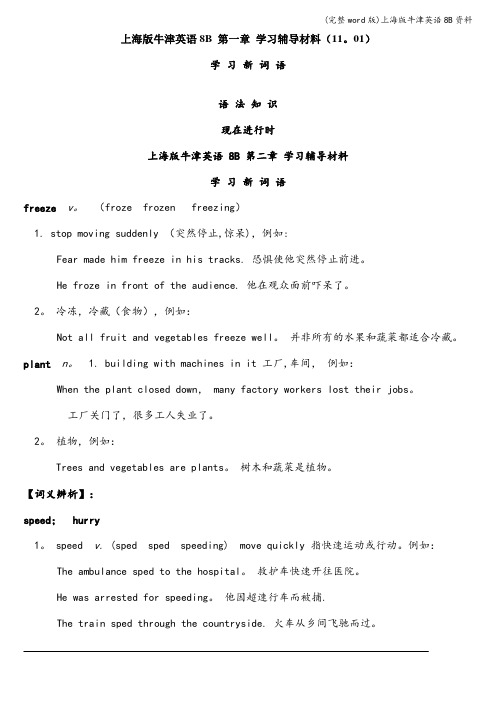
上海版牛津英语8B 第一章学习辅导材料(11。
01)学习新词语语法知识现在进行时上海版牛津英语 8B 第二章学习辅导材料学习新词语freeze v。
(froze frozen freezing)1. stop moving suddenly (突然停止,惊呆),例如:Fear made him freeze in his tracks. 恐惧使他突然停止前进。
He froze in front of the audience. 他在观众面前吓呆了。
2。
冷冻,冷藏(食物),例如:Not all fruit and vegetables freeze well。
并非所有的水果和蔬菜都适合冷藏。
plant n。
1. building with machines in it 工厂,车间,例如:When the plant closed down, many factory workers lost their jobs。
工厂关门了,很多工人失业了。
2。
植物,例如:Trees and vegetables are plants。
树木和蔬菜是植物。
【词义辨析】:speed; hurry1。
speed v. (sped sped speeding) move quickly 指快速运动或行动。
例如:The ambulance sped to the hospital。
救护车快速开往医院。
He was arrested for speeding。
他因超速行车而被捕.The train sped through the countryside. 火车从乡间飞驰而过。
Postal workers labored overtime to speed delivery of the Christmas mail.邮政工人加班加点已加速圣诞期间新信件的发送。
2. hurry v。
move or do sth. quickly or too quickly 意指比通常快得多的速度,经常伴随着混乱或骚动。
牛津上海版八年级初二下册英语第6讲-宾语从句-教案-八佰伴

教育1对3辅导讲义学员姓名:学科教师:年级:八年级辅导科目:英语授课日期时间主题宾语从句1. 了解宾语从句的基本概念,掌握宾语从句三要素;学习目标2. 能在具体语境中灵活运用宾语从句。
教学内容1、上次课后巩固作业复习;2、互动探索。
教学建议:鼓励学生自主翻译宾语从句,相互批改指正,教师帮忙指导。
教练对他们说,他们下个月将和美国队打一场比赛。
这句话用英文要怎么翻译?宾语从句你会吗?The coach told them that they would have a football match against the American team.请试着翻译下面这几句话:他告诉我地球是圆的。
He told me that the earth is round.你知道凯特的电子邮件地址吗?Do you know what Kate’s email address is?他问我是不是来自中国。
He asked me whether I came from China.你能告诉我他什么时候去的美国吗?Could you tell me when he went to America?他不知道下一步该做什么。
He didn’t know what to do next.我记得他昨天给了我一本书。
I remembered that he gave a book yesterday.他已经告诉我明天他就要动身去纽约了。
He has told me that he will leave for New York tomorrow.教学建议:1.建议老师在讲解宾语从句前先进行句子成分和句子结构知识的引导,让学生清楚什么叫宾语及宾语从句;2.宾语从句语序和引导词上,用发现式教学法,通过具体的例句让学生总结出规律;3.老师在教学过程中的举例尽量贴近学生的生活。
一、词汇Words1.1. servant n. 仆人;佣人e. g. Fire and water may be good servants, but bad masters. [谚]水火是忠仆,用之不慎成灾主。
- 1、下载文档前请自行甄别文档内容的完整性,平台不提供额外的编辑、内容补充、找答案等附加服务。
- 2、"仅部分预览"的文档,不可在线预览部分如存在完整性等问题,可反馈申请退款(可完整预览的文档不适用该条件!)。
- 3、如文档侵犯您的权益,请联系客服反馈,我们会尽快为您处理(人工客服工作时间:9:00-18:30)。
Word bank原因状语从句教学目标:1.学习原因状语从句的用法2.掌握because, since, as, now that的区别3.for 引导的并列句与原因状语从句的辨析教学重点:1.学习原因状语从句的用法2.掌握because, since, as, now that的区别3.for 引导的并列句与原因状语从句的辨析教学难点:1.掌握because, since, as, now that的区别2.for 引导的并列句与原因状语从句的辨析一、课前预习:认真预习教材有关原因状语从句的知识点,系统了解原因状语从句的用法。
二、课堂活动:A、引导原因状语从句的连词原因状语从句一般由从属连词because, as, since,now that引导。
B、because, as, since和now that的区别:1、because“因为”,表示直接的原因,语气最强。
1)why提问的句子,必须用because回答。
2)because的从句常放在主句之后。
3)because 不能与so连用。
4)because+ 从句;because of+ 名词短语I missed the train because I got up late.He was angry not because we were late but because we made a noise.-Why didn’t he come yesterday? -Because he was ill.2、as“因为”,语气较弱,一般放在主句前,中间用逗号隔开,表示的是明显的原因。
As he was not well, I decided to go there without him.As it was raining hard, we had to be indoors.3、since/ now that“既然”,一般放在主句前,中间用逗号隔开,表示的是明显的原因或众所周知的事实。
Since/ Now that this method doesn’t work, let]s try another.Since/ Now that you feel ill, you'd better not go to work.C、for 引导的并列句与原因状语从句的辨析并列连词for“因为”,引导的不是从句,而是并列分句,只能放在主句之后,不能放在句首,常用逗号把它和前面的分句隔开。
对主句补充说明理由或推断原因。
It rained last night, for the ground is wet.She must have gone out early, for she had not come for breakfast.Exercise:一、填入恰当的连词1. I didn’t go to school yesterday _________ I was ill.2. ________ everybody is here, let’s begin our meeting.3. ________ you are in poor health, you should not stay up late.4. I asked her to stay to tea, ________ I had something to tell her.5. ________ all the passengers are here, why don’t we start at once?6. Bill won’t make any progress ________ he doesn’t study harder than before.7. He might have gone to bed, ________ the light went out.二、改写句子,保持句意不变1) The ship changed its course because there was a storm.The ship changed its course _______ _______ _______ _______.2) Because he was ill, he didn’t go to school.He was ill, _______ he didn’t go to school.3) He couldn't walk because his leg was broken.He couldn't walk ______ ______ his ______ leg.4) I came back because it was raining heavily.I came back ______ ______ the ______ rain.三、课堂小结:_______________________________________________________________________________ _______________________________________________________________________________ _______________________________________________________________________________ _______________________________________________________________________________四、回家作业:一、填入恰当的连词1. ______ you do not understand, I will explain again.2. ______ Jane was the oldest in this family, she had to look after the others.3. He must be ill, ______ he is absent today.4. The teacher must be strict with you ______they want you to make great progre ss.5. _____your father is well again, you no longer have anything to worry about.6. The day breaks, _____the birds are singing.7. ______ you are ill, you’d better go to see the doctor.8. ______ she was late for class, she had to say sorry.二、选择恰当的答案1. The man can’t get on the bus ______ there is no ro om on it.A. thoughB. becauseC. until D so that2. ______ her daughter hadn’t come back, ______ she looked worried.A. Because, /B. Because, soC. Though, butD. Though, /3._______ you’ve got a chance, you might make full use of it.A. Now thatB. AfterC. AlthoughD. As soon as4. He found it difficult to read, _______ his eyesight was beginning to fail.A. andB. forC. butD. or5. A man cannot smile like a child, ________ a child smiles with his eyes, while a man smiles with his lips alone.A. soB. butC. andD. for五、学生反馈:(在完成回家作业的过程中存在的问题)_______________________________________________________________________________ _______________________________________________________________________________ _______________________________________________________________________________ _______________________________________________________________________________六、教师反馈:(在批改学生回家作业中发现的问题)_______________________________________________________________________________ _______________________________________________________________________________ _______________________________________________________________________________ _______________________________________________________________________________Keys:A、引导原因状语从句的连词:because, as, since,now thatB、because, as, since和now that的区别:1、because:“因为”,表示直接的原因,语气最强。
1)why提问的句子,必须用because回答。
2)because的从句常放在主句之后。
3)because 不能与so连用。
4)because+ 从句;because of+ 名词短语2、as:“因为”,语气较弱,一般放在主句前,中间用逗号隔开,表示的是明显的原因。
3、since/now that:“既然”,一般放在主句前,中间用逗号隔开,表示的是明显的原因或众所周知的事实。
